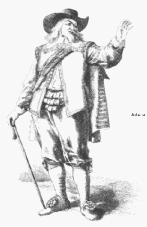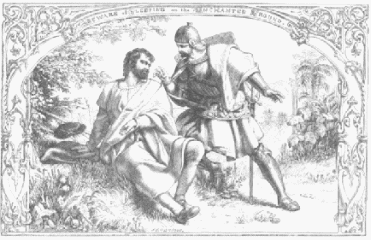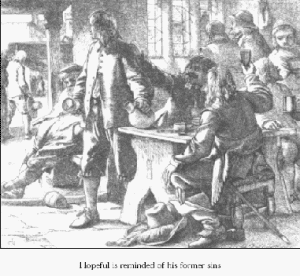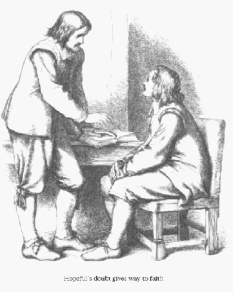Redimete Diem!
Look
carefully then how you walk, not as unwise but as wise,
making the most of the time, because the days are evil. (Eph. 5:15-16,
ESV)
Home |
The Pilgrim's
Progress |
Worship |
Sermons |
Courses
Christian Ethics |
Miscellany | Family
| Questions, etc.
Notes Regarding the Characters in
Pilgrim's Progress
Lesson #23
The Flatterer - [T]he human mind is always accessible to flattery, in one form or other; and there have in every age been teachers and professed Christians, who have soothed men into a good opinion of their state on insufficient grounds; or fed their spiritual pride by expressing too favourable thoughts of their attainments, which is often mistaken for a very loving spirit. This directly tends to induce unwatchfulness, and an unadvised way of deciding in difficult cases: and thus men are imperceptibly led to consult their own inclination, ease, or interest, instead of the will and glory of God. In the mean time, such flatterers commend their prudence, in allowing themselves a little rest; persuade them that they are entitled to distinction, and exempted from general rules; insinuate, that they are too well acquainted with Satan's devices to be deceived; and in short seem to make their opinion the standard of right and wrong. Some excellent men, from a natural easiness of temper, united with spiritual love and genuine candour, thus undesignedly too much soothe their brethren. [B]ut the Flatterer is a black man in a white robe; a designing hypocrite, who, with plausibility, fluency of speech, talents, eloquence, or polite accomplishments, and very evangelical views of religion, “serves not our Lord Jesus Christ, but his own belly; and by good words and fair speeches deceives the hearts of the simple.” (Scott, p. 290-1)

You all understand, my brethren, that the man black of flesh but covered with a white robe was no wayside seducer who met Christian and Hopeful at that dangerous part of the road only, and only on that high-minded day. You know from yourselves surely that both Christian and Hopeful carried that black but smooth-spoken man within themselves. The Flatterer who led the two pilgrims so fatally wrong that day was just their own heart taken out of their own bosom and personified and dramatised by Bunyan's dramatic genius, and so made to walk and talk and flatter and puff up outside of themselves till they came again to see who in reality he was and whence he came, - that is to say, till they were brought to see what they themselves still were, and would always be, when they were left to themselves. ... “He that slanders me,” says Cowper, “paints me blacker than I am, and he that flatters me whiter. They both daub me, and when I look in the glass of conscience, I see myself disguised by both.” ... Christ's praise and the applause of His saints and angels are so future and so far away from us, and man’s praise and the applause of this world, hollow and false as it is, is so near us, that we feed our souls on offal and garbage, when we might be feasting our souls on the finest of the wheat, and satisfying them with honey out of the rock. (Whyte, pp. 29-31)
There are many other flatterers: but this description, coming far more in the way of evangelical professors than any other, seems emphatically to be intended. Satan aims to lull men into a fatal security, wholly or in part; flatterers of every kind are his principal agents; and a smooth undistinguishing gospel, and want of plain-dealing in private, have immense influence in this respect. Too often ... the preacher uses flattery in the pulpit and the parlour, and is reciprocally flattered or rewarded: and what wonder is it, if ungodly men take up the business as a lucrative trade, and serve their own selfish purposes, by quieting uneasy consciences into a false peace, misleading unwary souls, entangling incautious believers in a net, and thus bringing a scandal on the gospel? “Satan is transformed into an angel of light, and his ministers into ministers of righteousness”; and if this were the case in the apostles’ days, in the midst of terrible persecutions; it may well be expected, that the same attempts will be made at other times. Among persons not much acquainted with the gospel, a different method of seduction will be employed; in some places by vain philosophy or pharisaical self-righteousness, in others by enthusiastic imaginations or dreams of sinless perfection: but among established Christians, some plausible scheme, flattering men as wise and strong in Christ, and as knowing their liberty and privileges, must be adopted; such as were propagated among the Corinthians, or those professed Christians whom James, Peter, and Jude successively addressed. In the present state of religious profession, a more important caution, I apprehend, cannot be given by the united voice of all those ministers, whom the Shepherds represent, than this, “Beware of the Flatterer”; of all teachers who address the self-preference of the human heart, and thus render men forgetful of “taking heed to their way according to the word of God”. For if men overlook the precepts of Scripture and forsake practical distinguishing preachers, to follow such as bolster up their hopes in an unscriptural manner; they will either be fatally deceived, or drawn out of the path of truth and duty, taken in the net of error, and entangled among injurious connextions and with perplexing difficulties. They will indeed at length be undeceived as to these fine-spoken men, but not till they scarcely know what to do or what will become of them. For when the Lord plucks their feet out of the net, he will humble them in the dust for their sin and folly; and make them thankful to be delivered, though with severe rebukes and corrections. (Scott, p. 291-2)
Atheist
- Some false professors renounce “the truth as it is in Jesus”: but
others openly set themselves against all kinds of religion, and turn
[into] scoffers and infidels. Indeed none are more likely to become
avowed atheists, than such as
 have for many years hypocritically
professed the gospel; for they often acquire an acquaintance with the
several parts of religion, their connexion with each other, and the
arguments with which they are supported; ... And, as they have
principally associated with loose professors, and witnessed much folly
and wickedness among them; they willingly take up a bad opinion of all
who pretend to piety, and so they make a desperate plunge, and treat the
whole of religion as imposture and delusion; pretending, that upon a
thorough investigation, they find it to be a compound of knavery, folly,
and fanaticism. Thus God in awful judgment permits Satan to blind their
eyes, because they “obeyed not the truth, but had pleasure in
unrighteousness”. Men set out with a dead faith and a worldly heart,
and at length occupy the seat of the scorner! The vain reasonings and
contemptuous sneers of apostates, may turn aside other unsound
characters, and perplex new converts; but the experience of established
believers will fortify them against these manifest delusions; and
corrections for previous mistakes will render them jealous of themselves
and one another; so that they will go on their way with greater
circumspection, and pity the scorner who ridicules them. (Scott, p. 293)
have for many years hypocritically
professed the gospel; for they often acquire an acquaintance with the
several parts of religion, their connexion with each other, and the
arguments with which they are supported; ... And, as they have
principally associated with loose professors, and witnessed much folly
and wickedness among them; they willingly take up a bad opinion of all
who pretend to piety, and so they make a desperate plunge, and treat the
whole of religion as imposture and delusion; pretending, that upon a
thorough investigation, they find it to be a compound of knavery, folly,
and fanaticism. Thus God in awful judgment permits Satan to blind their
eyes, because they “obeyed not the truth, but had pleasure in
unrighteousness”. Men set out with a dead faith and a worldly heart,
and at length occupy the seat of the scorner! The vain reasonings and
contemptuous sneers of apostates, may turn aside other unsound
characters, and perplex new converts; but the experience of established
believers will fortify them against these manifest delusions; and
corrections for previous mistakes will render them jealous of themselves
and one another; so that they will go on their way with greater
circumspection, and pity the scorner who ridicules them. (Scott, p. 293)
When the church and her ministers, when the Scriptures and their anomalies, and when the faults and failings of Christian men are made the subject of mockery and laughter, the reverence, the fear, the awe, the respect that all enter so largely into religion, and especially into the religion of young people, is too easily destroyed; and not seldom the first seeds of practical and sometimes of speculative atheism are thus sown. The mischief that has been done by mockery and laughter to the souls, especially of the young and the inexperienced, only the great day will full disclose. (Whyte, p. 43)
Enchanted Ground
- The Enchanted Ground may represent a state of exemption from peculiar
trials, and [a state] of worldly prosperity; especially when Christians
are unexpectedly advanced in their outward circumstances, or engaged in
extensive flourishing business. [T]he believer’s peace is little
interrupted, but he has not very high affections or consolations; he
meets with respect and attention from his friends and acquaintance; and
is drawn on by success in his secular undertakings. This powerfully
tends, through remaining depravity, to produce a lethargic and indolent
frame of mind: the man attends on religious ordinances, and the constant
succession of duties, more from habit and conscience, than from delight
in the service of God: ... No situation, in which a believer can be
placed, requires so much watchfulness: other experiences resemble
storms, which keep a man awake almost against his will; this is a
treacherous calm, which invites and lulls him to sleep. But pious
discourse, the jealous cautions of faithful friends, and recollections
of the Lord's dealings with us in times past, are admirably suited to
counteract this tendency. (Scott, p. 295)
worldly prosperity; especially when Christians
are unexpectedly advanced in their outward circumstances, or engaged in
extensive flourishing business. [T]he believer’s peace is little
interrupted, but he has not very high affections or consolations; he
meets with respect and attention from his friends and acquaintance; and
is drawn on by success in his secular undertakings. This powerfully
tends, through remaining depravity, to produce a lethargic and indolent
frame of mind: the man attends on religious ordinances, and the constant
succession of duties, more from habit and conscience, than from delight
in the service of God: ... No situation, in which a believer can be
placed, requires so much watchfulness: other experiences resemble
storms, which keep a man awake almost against his will; this is a
treacherous calm, which invites and lulls him to sleep. But pious
discourse, the jealous cautions of faithful friends, and recollections
of the Lord's dealings with us in times past, are admirably suited to
counteract this tendency. (Scott, p. 295)
Concerning the Guilt of Sin - This word is used here [in Christian and Hopeful’s conversation] ... not to signify the evil of sin in the sight of God, and the transgressor’s deserved liableness to punishment: but the remorse and fear of wrath, with which the convinced sinner is oppressed, and from which he often seeks relief by means which exceedingly increase his actual guilt. Nothing except a free pardon, by faith in the atoning sacrifice of Christ, can take away guilt: but the uneasiness of a man’s conscience may be for a time removed by various expedients. (Scott, p. 298)
Concerning Hopeful’s
Conversion Experience
- Coming to Christ is properly the effect of faith: yet the
language here used is warranted by Scripture. The word reveal,
and the vision of Christ conversing with Hopeful, seem to
sanction such things as have been greatly mistaken and abused, and have
occasioned many scandals and objections: yet it is evident, that the
author meant nothing contrary to the most sober statement of scriptural
truth. Christ did not appear to Hopeful’s senses, but to his
understanding: and the words spoken are no other than texts of
Scripture taken in their
 genuine meaning; not informing him, as by a new
revelation, that his sins were pardoned, but encouraging him to apply
for this mercy and all other blessings of salvation. So that, (allowing
for the nature of an allegory), the whole account for substance exactly
coincides with the experience of the most sober Christians; who, having
been deeply humbled, and ready to sink under discouragement, have had
such views of the love of Christ, of his glorious salvation, the
freeness of the invitations, the largeness of the promises, and the
nature of justifying faith, as have ‘filled them with peace and joy in
believing’: and these have been followed by such abiding effects as are
here described, which completely distinguish them from all the false
joys of hypocrites and enthusiasts. Others indeed cannot relate so
orderly an account of their convictions and comforts; yet they are
brought, (though by varied methods,) to the same reliance on Christ, and
the same devoted obedience. (Scott, p. 304)
genuine meaning; not informing him, as by a new
revelation, that his sins were pardoned, but encouraging him to apply
for this mercy and all other blessings of salvation. So that, (allowing
for the nature of an allegory), the whole account for substance exactly
coincides with the experience of the most sober Christians; who, having
been deeply humbled, and ready to sink under discouragement, have had
such views of the love of Christ, of his glorious salvation, the
freeness of the invitations, the largeness of the promises, and the
nature of justifying faith, as have ‘filled them with peace and joy in
believing’: and these have been followed by such abiding effects as are
here described, which completely distinguish them from all the false
joys of hypocrites and enthusiasts. Others indeed cannot relate so
orderly an account of their convictions and comforts; yet they are
brought, (though by varied methods,) to the same reliance on Christ, and
the same devoted obedience. (Scott, p. 304)
For what is
hope? Hope is a passion of the soul, wise or foolish, to be ashamed of
or to be proud of, just according to the thing hoped for, and just
according to the grounds of the hope. Hope is made up of these two
ingredients - desire and expectation. What we greatly desire we take no
rest till we find good grounds on which to build up our expectations on
it; and when we have found good grounds for our expectations, then a
glad hope takes possession of our hearts. Now, to begin with, how is it
with your desires? You are afraid to say much about your expectations
and your hopes. Well; let us come to your hearts’ desires. - Men of
God, I will enter into your hearts and I will tell you your hearts’
desires better than you know them yourselves; for the heart is deceitful
above all things. The time was, when, like this young pilgrim before he
became a pilgrim, your desires were all set on houses; and lands, and
places, and honours, and preferments, and wives, and children, and
silver, and gold, and what not. These things at one time were the
utmost limit of your desires. But that has all been changed. For now
you have begun to desire a better city, that is, an heavenly. What is
your chief desire for this New Year? Is it not a new heart? Is it not
a clean heart? Is it not a holy heart? Is it not that the Holy Ghost
would write the golden rule on the tables of your heart? Does not God
know that it is the deepest desire of your heart to be able to love your neighbour as yourself? To be able to rejoice with him in his joy as
well as to weep with him in his sorrow? What would you not give never
again to feel envy in your heart at your brother, or straitness and
pining at his prosperity? (Whyte, p. 52-3)
heart? Is it not a holy heart? Is it not that the Holy Ghost
would write the golden rule on the tables of your heart? Does not God
know that it is the deepest desire of your heart to be able to love your neighbour as yourself? To be able to rejoice with him in his joy as
well as to weep with him in his sorrow? What would you not give never
again to feel envy in your heart at your brother, or straitness and
pining at his prosperity? (Whyte, p. 52-3)
------------------------------------
notes taken from:
The Pilgrim's Progress by John Bunyan with Explanatory Notes by Thomas Scott, Swengel, PA:Reiner Pub., 1976.
Bunyan Characters in the Pilgrim's Progress, vol. 2, by Alexander Whyte, London:Oliphant Anderson and Ferrier, 1902.
david.barker@ncpres.org